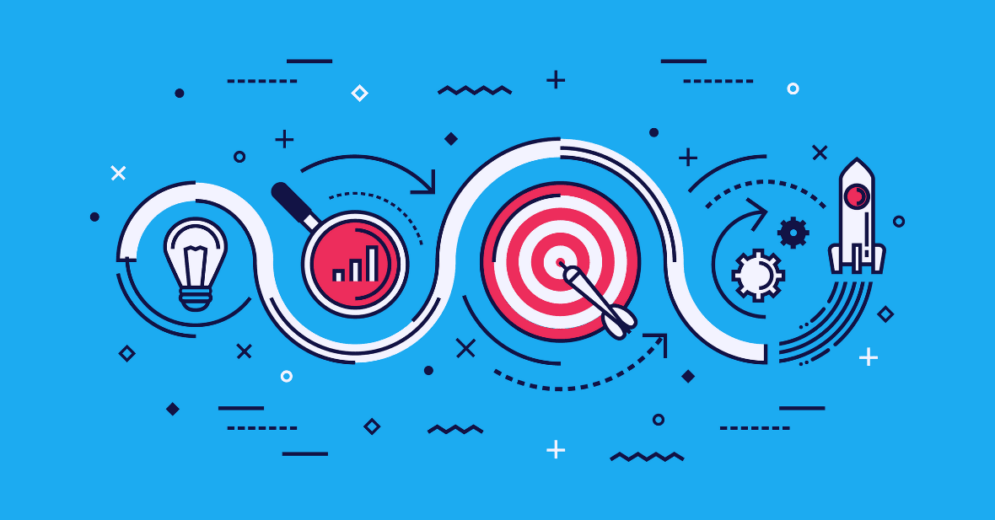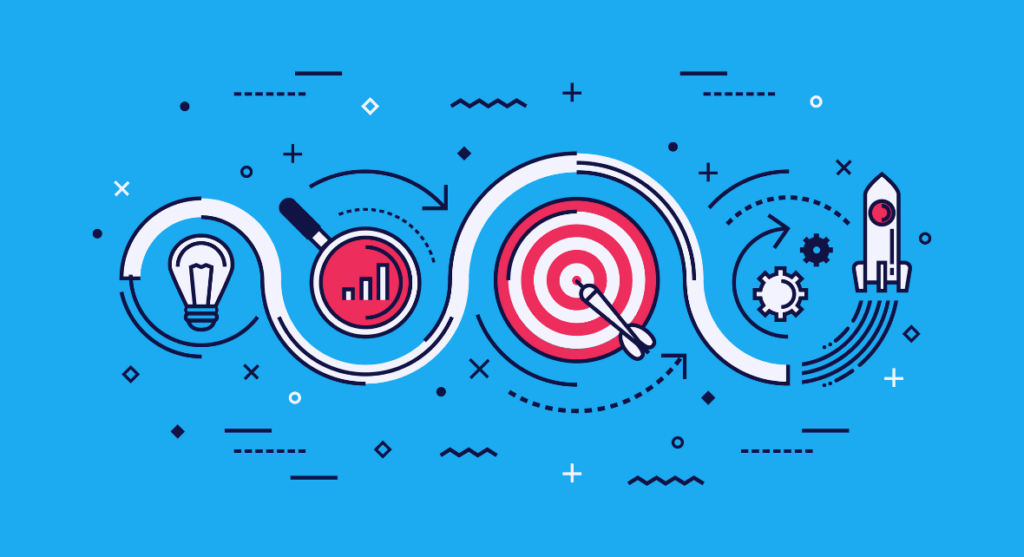When it comes to professions, a few always come to mind: accountants, doctors, dentists, lawyers, and architects. If you talked to an accountant, you probably wouldn’t ask for details about their profession.
Their responsibilities and competencies are clear to most of us, so there’s not much confusion around these occupations.
However, there are jobs in high demand right now that we know nothing about – or close to nothing. And the role of a Product Manager is one of those.
Despite being a common position, as technology advances and their responsibilities shift, we might get quite confused about the scope of this job.
Throughout this article, we'll go over some general concepts of what it means to be a Product Manager, their primary obligations, and what to consider if you want to follow this path and become a PM yourself! Enjoy your reading!
What is Product Management?
Product Management means literally managing a product.
In this sense, we can say that Product Management is responsible for every activity involving a product's life cycle, whether digital or not. Such as:
- Initial market research;
- Competition analysis;
- Financial analysis;
- Product development;
- Defining releases;
- Marketing strategy;
- After-sales.
Notice that Product Management covers many disciplines and is essential for a company's product development.
However, no matter how much we summarize activities, the activities and responsibilities of a Product Manager may vary a lot from company to company.
There's no consensus about the job description, but let's take a look at this through some interesting perspectives surrounding UX Design.
What makes a Product Manager different from other positions?
The role of a product manager is often described as the CEO of a product. And it makes sense, considering that PMs are responsible for a product’s entire life cycle – from research to revenue growth.
However, Martin Eriksson brings another aspect to light. He says that "Product managers simply don’t have any direct authority over most of the things needed to make their products successful."
Unlike a CEO, there are too many things that PMs can't control: from user and data research through design and development to marketing, sales, and support.
Product Management is the intersection of competencies
According to Martin Eriksson's line of thought, product management is "the intersection between business, technology, and user experience."

Business
Product Managers must focus on optimizing the product and, by doing so, maximizing the business value.
To achieve this, they must communicate successfully with developers, customers, and stakeholders, being the point of connection between them.
Technology
Product Managers are directly involved with the development of their products. So they should also understand how a product is built and how the technology works.
This is especially important in agile projects where the PM spends most of the time with developers.
Of course, there's no need to code, but it's important that a PM knows what is happening in order to make the best decisions.
User Experience
The Product Manager is responsible for connecting users and the company as it should be. In fact, it’s common to say that they advocate in favor of the customer because they represent their interests.
Consequently, they must understand the concepts of Usability and UX Design.
Again, it's not necessary to be an expert in UX, but it's essential to know the user in-depth, their needs and pain points, to build the best possible product for them.
A Product Manager doesn't have to be an expert in all three fields. However, it's indispensable to master at least one of them. So depending on their specific area of expertise, the Product Manager profile might vary between:
- Technologist;
- Generalist;
- Business-oriented.
Product Manager: archetypes
It becomes clear then that PMs' profiles differ amongst themselves according to their experience or background.
Mckinsey's authors have written about how products and their ecosystems are becoming more complex, taking us back to the definition of PMs becoming mini CEOs of products. Based on that, there are three common profiles of the mini-CEO archetype:

Technologist
This profile is profoundly technical and focuses on solutions based on technology. As a result, they are the perfect fit for back-end platforms or complex B2B products.
The downside: they also tend to take chances on technological ideas that aren't tied to metrics.
Generalist
This profile is business savvy with technical knowledge.
Their main focus is user delight, so it makes sense to put them in charge of B2C products or front-end for B2B products.
Generalists can drive end-user metrics.
Business-oriented
These Product Managers have a business background, and their focus is to maximize specific business metrics.
They are a perfect fit for B2C products with another source for creative inputs.
The profiles above are based on interviews with Product Managers carried out by Mckinsey. As much as each of these profiles has its own bias, it’s essential that Product Managers remain at the center of the intersection of the three competencies defined by Eriksson (UX, business, technology).
What are the responsibilities of a Product Manager?

The role of a Product Manager is not as well defined as a lawyer or doctor, for example.
And as mentioned, the scope might vary from company to company.
However, there are a few core responsibilities that all PMs should focus on, no matter the company, market, or profile.
- Strategy
- Research
- Planning
- Communication and leadership
- Coordinating development
- Feedback and data analyses
Strategy
Without a doubt, defining the strategy of a product is one of the core responsibilities of a Product Manager.
The plan should contemplate the vision and objectives of a product without neglecting the company's goals and their limitations, such as budget, time, and personnel.
The strategy includes the prioritization of features and a rough timeline. PMs typically use a product roadmap to develop the strategy.
Research
Together with the UX designer, the Product Manager is responsible for the connection between users and the company.
Therefore, it's essential for the person in this position to be part of research groups; defining personas, user needs, their pains, and identifying competitors and the market.
Planning
Another responsibility in the hands of the Product Manager is creating a plan for product development.
They establish deadlines, methodologies, flows, and processes to make the development run smoothly.
Remember that planning is directly linked to strategy. So the Product Manager is the person in charge of putting strategy into execution.
Communication and Leadership
This responsibility includes cross-functional leadership.
Being in a management position, it's imperative that PMs communicate clearly with their teams and convey a sense of leadership, building trust and motivating employees.
Besides, Product Managers are responsible for linking projects and stakeholders — the strategy gets presented to key executives, investors, and team members.
Therefore, these professionals should master communication and storytelling skills.
Coordinating Development
Coordinating Development is one of the main responsibilities of a Product Manager.
After defining a strategy and the roadmap to get there, it's time to put plans into action.
During realization, PMs are responsible to coordinate the whole process, working together with relevant departments such as the development, marketing, and sales team.
The Product Manager is responsible for coordinating the entire process, from choosing ideas and prioritizing features through aligning marketing and sales plans to usability tests.
Feedback and data analyses
The responsibilities don't end upon product release.
After the product has been launched, the PM will monitor and analyze data to learn from user feedback and indicators.
After analysis, it's time to set action plans to enhance the product according to the feedback received – and start the process all over again.
What’s necessary to become a Product Manager?

So far, we have seen what Product Management is and the primary responsibilities of a PM.
But what should you do to become a Product Manager?
Julia Austin stated that as an aspiring Product Manager, there are three crucial factors to consider:
- Core Competencies;
- Emotional Intelligence (EQ);
- Company fit.
1) Core competencies
Despite PMs’ responsibilities being fluid, core competencies are basic skills that every Product Manager should cover – and they will be a game-changer to your career.
Some examples of these skills are:
- conducting customer interviews and user testing;
- running design sprints;
- feature prioritization and road map planning;
- knowing how to resource allocation;
- performing market assessments;
- communication between business and technical requirements, and vice versa;
- pricing and revenue modeling;
- defining and tracking success metrics, like OKRs and KPIs.
These core competencies are the foundation for any PM and over time you will get better at them.
You can excel as a Product Manager by reflecting on how these skills have contributed to the success or failure of your products.
2) Emotional Intelligence (EQ)
The EQ of a Product Manager will be necessary on many levels and situations.
The best PMs can empathize with customers, being sensible enough to perceive customer reactions and body language (during interviews for example) to read and understand the user in the best possible way.
There's are four critical traits of EQ, as defined by Daniel Goleman, that relates to the PM role:
- Relationships: as a management position, they should foster reliable connections among stakeholders and their teams. A great PM inspires people and helps them reach their full potential. Relationship management is also essential to negotiate successfully, resolve conflicts, and work with others toward a shared goal;
- Self-awareness: PMs should be able to distinguish their own preferences and pain points from their consumers. If not self-aware, a PM may push to prioritize a feature even when all customers interviews and evidence are piled against it;
- Self-management: Product Management can be quite stressful. Working with several people, tight deadlines, and resolving and prioritizing conflicts and goals might burden a PM's life. In this sense, Emotional Intelligence is important to remain calm under pressure and to know their limits;
- Social awareness: It's not just toward their customers that PMs should be empathic. They should also understand the concerns of the sales, support, or engineering team.
3) Company fit
Having the essential skills and high Emotional Intelligence to work as a Product Manager is not the whole story.
In fact, finding a company that matches your profile will be the key ingredient.
Of course, we can't always afford to be picky, especially if you're starting a new career. But sometimes, waiting for the right fit could turn your first step into a leap.
The ideal scenario would be to identify which companies, or at least, what kind of company/product best fits your profile as a Product Manager.
In order to do so, analyze the following key areas in which companies differ in their search for a Product Manager:
- Do your technical skills match the company's product?
- Do you share the same philosophy regarding Product Management?
- What stage is the company in?
Do your technical skills match the company's product?
Each company requires a different set of abilities from their PMs according to their product and customers.
If the product is a SaaS CRM, the company will look for someone that has experience around go-to-market and customer lifecycles rather than around how the product is built.
Therefore, the more your skills and background align with what the company expects, the more you will succeed.
Of course, you may want to change products and face new challenges.
That's normal.
But if that's not the case, pay attention to the company's product and if your skillset and experiences match the product's demands.
Do you share the same philosophy regarding Product Management?
Every company has a unique philosophy about the product development process and where Product Managers fit into that process.
But they can be roughly categorized into 3 different “extremes” according to the autonomy PMs and Engineers share in a given product.
This alignment is essential to understand how much autonomy you will have working for a specific company.
What stage is the company in?
Is the company mature, or is it in the early stages?
If it's a Startup, your role as a PM will most likely be broader because teams will probably be smaller.
If, on the other hand, the company is mature, its processes — in theory — are better established and responsibilities will be well defined.
Regardless, think about the company you want to work for so you can benefit the most from this experience.
Final considerations
A Product Manager has a lot of responsibility in product development. It's an interesting, growing, and quite challenging career.
If you are on the road to becoming a great product manager, consider all of the above before applying to your next job. The definition of a PM is not set in stone, and it can still change a lot since the market and technology are constantly evolving.
Nevertheless, developing the core competencies mentioned in this article will be indispensable for marking your way up. Working on your skills will be an ongoing activity throughout your career, and leveraging EQ will ensure a more positive experience.
And as Julia Austin – lecturer at Harvard Business School, said: "Where you work, how they work, and whom you work with and for will ultimately determine your long-term success."








